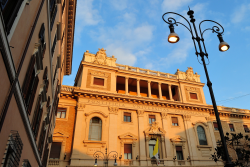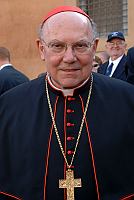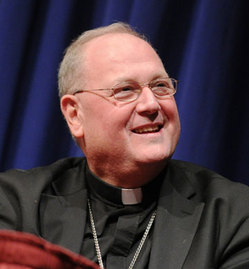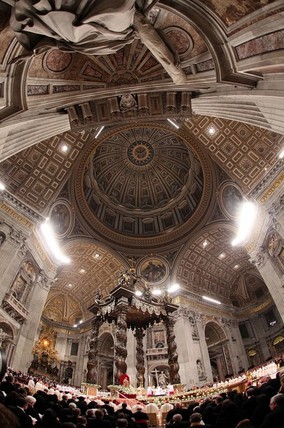The Jesuit-run School of Theology and Ministry has had a priest on their faculty who’s refused to function as a Catholic until he gets an adequate explanation as to why women are not ordained as Catholic priests. He wrote to the Cardinal stating his position. John Shea, professor of pastoral care and counseling, now leaving his position because of dissent from Church teaching. Thanks be to God. The Jesuits have tolerated this act of scandal for too long. Shea’s work in the classroom and beyond is not in line with his role as a professor who trains men for priesthood and the laity for ministry. He’s not to pose his thinking as Catholic teaching nor is he asked by the Church to teach students for priesthood and ministry in dissenting theology. Recall: Saint Ignatius of Loyola asks an attitude of “thinking with the Church” not dissenting from the truth of Jesus Christ and His Church.
Category: Faith & Reason
Erroneous judgement –what does the Church teach
Many of say that conscience rights is under attack. And with good reason. Take for instance the US Senate’s recent rejection of conscience rights viz. President Obama’s healthcare fiasco. So, a reasonable question is what the understanding of the role of conscience in moral decision making?
The Catechism of the Catholic Church (par. 1790-93) states the following about erroneous judgement:
A human being must always obey the certain judgment of his conscience. If he were deliberately to act against it, he would condemn himself. Yet it can happen that moral conscience remains in ignorance and makes erroneous judgments about acts to be performed or already committed.
Continue reading Erroneous judgement –what does the Church teach
“Building a New World”: exploring human and spiritual issues through film
“Building a New World” is new initiative Interdisciplinary Centre for Social Communications of the Pontifical Gregorian University (Rome, Italy) beginning today, Friday, 2 March.
This project is focused on film and the power film has in our lives. The premise is: a good film liberates, forms and calls us to a new way of seeing and engaging in reality. Therefore, the good people at the Gregorian are exploring how a good movie or documentary can invite people to greatness through the imagination and research how a poorly written movie with mediocre images can severely handicap one’s openness to the true, the beautiful and the good. Just think of the good Father Robert Barron’s “Catholicism” project is doing for those learning the Catholic faith for the first time or those renewing their faith; or how damaging “The Deputy” was to to the person of Pope Pius XII and the rest of the Church.
Jesuit Father Lloyd Baugh, a professor of film, told Vatican Radio that the initiative honors the 30th anniversary of the University’s Center for Interdisciplinary Study. It is popular these days to get at human, theological and philosphical issues by the use of film. Friends of mine do it regularly in the schools in which they instruct young minds: Benedictine Father Bede Price teaches a theology and film course at his abbey’s Priory School (St Louis, MO) and Jesuit Father Edward Oakes does so at Mundelein Seminary (outside Chicago, IL). Father Baugh he teaches theology using film as the text for class: Christology through the “Jesus films,” moral issues through the “The Decalogue” of Kieslowski, interreligious dialogue through a whole series of films from different religious traditions and so on.
The current cycle of films starting today will be inaugurated by the Gregorian University Rector Jesuit Father Dumortier, Archbishop Claudio Celli, President of the Pontifical Council for Social Communications, of Jesuit Father Savarimuthu, director of the Centre for Interdisciplinary Studies at the Gregorian University, and Father Baugh.
The first film is “Welcome.” which focuses on a young Kurdish boy who attempts to illegally enter England, and in doing so encounters other people changing their vision of the world, and ultimately their lives. “Welcome” is a award 2009 winning film directed by Philippe Loiret.
Other films include
March 23: “Water” (2005 Deepa Mehta film) focuses on Asia and on “the right to Freedom” drawing attention to the tragic reality of millions of young girls in India who are promised in marriage to elderly men and widowed shortly thereafter, leaving them destitute for the rest of their lives.
April 20: “La Zona” (2007 Roderigo Pla film) dedicated to the “Americas” and to the “right to Justice”, highlighting the persistent and ever-growing disparity between rich and poor particualrly in Latin America.
May 4: “Son of Man” (2006 Mark Dornford May) looks at the plight of the African continent and its “right to Hope”. May directs a narrative of the Gospel and situating the contemporaneous of the biblical reality of a township outside of Cape Town. The desire for peace is continuously punctuated by violence. It is a look at how Jesus would respond to the human reality before his eyes and what he does to change people’s hearts.
Screenings are free and everyone is welcome. For more information visit: www.unigre.it
Wisdom … our life … in Christ
It was brought to my attention that we need to ask the Holy Spirit for wisdom. We need help. So ask for it. Let’s look at what the Church said at the Second Vatican Council about our own times in Gaudium et Spes:
To carry out such a task, the Church has always had the duty of scrutinizing the signs of the times and of interpreting them in the light of the Gospel. Thus, in language intelligible to each generation, she can respond to the perennial questions which men ask about this present life and the life to come, and about the relationship of the one to the other. We must therefore recognize and understand the world in which we live, its explanations, its longings, and its often dramatic characteristics. Some of the main features of the modern world can be sketched as follows.
Today, the human race is involved in a new stage of history. Profound and rapid changes are spreading by degrees around the whole world. Triggered by the intelligence and creative energies of man, these changes recoil upon him, upon his decisions and desires, both individual and collective, and upon his manner of thinking and acting with respect to things and to people. Hence we can already speak of a true cultural and social transformation, one which has repercussions on man’s religious life as well.
Orthodox bishops rally faithful to protest the Obama administration
 The Assembly of Canonical Orthodox Bishops of North
The Assembly of Canonical Orthodox Bishops of North
and Central America, which is comprised of the 65 canonical Orthodox bishops in
the United States, Canada and Mexico, join their voices with the United States
Conference of Catholic Bishops and all those who adamantly protest the recent
decision by the United States Department of Health and Human Services,
and call upon all the Orthodox Christian faithful to contact their elected
representatives today to voice their concern in the face of this threat to the
sanctity of the Church’s conscience.
Continue reading Orthodox bishops rally faithful to protest the Obama administration
The Sexual Abuse of Minors: A Multi-faceted Response to the Challenge, Cardinal William Levada’s address
Today, in Rome,
there is a Gregorian University sponsored Symposium entitled “Towards Healing
and Renewal.” It is a four day gathering of professionals and clergy-types who
have responsibility for working with victims and family members of sexual
abuse. While not personally in attendance, Pope Benedict XVI was present
through his personal message sent to participants and with the presence of
several cardinals and bishops, Including William Cardinal Levada, 76, Prefect of
the Congregation for the Doctrine of the Faith. Cardinal Levada’s address, “The
Sexual Abuse of Minors: A Multi-faceted Response to the Challenge,”
follows.
The Pope’s message iterates in this context, as he has done in the
past, his hope and life’s work that “healing for abuse victims must be of
paramount concern in the Christian community,” with “a profound renewal of the
Church at every level.” Further, he “supports and encourages every effort to
respond with evangelical charity to the challenge of providing children and
vulnerable adults with an ecclesial environment conducive to their human and
spiritual growth” and he urges the participants in the Symposium “to continue
drawing on a wide range of expertise in order to promote throughout the Church
a vigorous culture of effective safeguarding and victim support.”
The Sexual
Abuse of Minors: A Multi-faceted Response to the Challenge Toward Healing and
Renewal” is the title given to this Symposium for Catholic Bishops and
Religious Superiors on the Sexual Abuse of Minors. For leaders in the Church
for whom this Symposium has been planned, the question is both delicate and
urgent. Just two years ago, in his reflections on the “Year for Priests” at the
annual Christmas greetings to the Roman Curia, Pope Benedict XVI spoke in
direct and lengthy terms about priests who “twist the sacrament [of Holy
Orders] into its antithesis, and under the mantle of the sacred profoundly
wound human persons in their childhood, damaging them for a whole lifetime.” I
chose this phrase to begin my remarks this evening because I think it important
not to lose sight of the gravity of these crimes as we deal with the multiple
aspects the Church’s response.
The priority renewal of the faith
The full body of the Congregation for the Doctrine of the Faith met with the Pope on Friday, 27 January, to discuss his conviction that no other work of the Church, particularly this congregation, takes precedence to the work of evangelization. Everyone ought to be committed “to bringing God back into this world and to opening to all men access to the faith.”
Benedict see now as the opportune moment “to point out to all the gift of faith in the Risen Christ, the clear teaching of the Second Vatican Council and the invaluable doctrinal synthesis offered by the Catechism of the Catholic Church.” Recently, the Pope said that “we are facing a profound crisis of faith, a loss of religious meaning which constitutes the greatest challenge to the Church” (Message for World Mission Day).
Other things that concern us, the Pope noted were:
1. the unity among Christians: maintaining “coherence in the ecumenical task with the Second Vatican Council and the whole of Tradition”;
2. warned of the dangers of “a shallow moralism”;
3. to promote “the logic” contained in the conciliar teaching: “the sincere search for the full unity of all Christians is a dynamism animated by the Word of God”;
4. a need for a “discernment between Tradition with a capital letter and the traditions”: “There exists,” he said, “a spiritual wealth in the different Christian confessions, which is an expression of the one faith and gift to share” (reflecting the recent work done for the full communion of Anglicans).
The last concern of Benedict was that the entire Church speak with one voice with Peter.
Law and the Gospel of Life –Archbishop Dolan addresses a NY crowd
Fordham Law School’s Institute on Religion, Law & Lawyer’s Work hosted Archbishop Timothy Michael Dolan, PhD, for an inaugural address in the Law and the Gospel of Life series.
Sadly, it didn’t make the news, well not much was said around the area about it. Fordham University published this brief press release read here. The crowd exceed initial expectations and a change of venue was made. Cardinal-designate Dolan centered his comments on Blessed John Paul II landmark encyclical, the Evangelium Vitae (1995). An excerpt of Dolan’s remarks follows, below is the link to his entire text:
The Gospel of Life proposes an alternative vision of law and culture, one that provides an antidote to the pragmatic nihilism that produces a Culture of Death. It seeks to recapture the essential relationship between the civil law and the moral law, and to foster a culture in which all human life is valued and authentic human development is possible.
Continue reading Law and the Gospel of Life –Archbishop Dolan addresses a NY crowd
Christ’s desire for unity, a communio
The Papal General Audience given in the Paul VI Hall today, Benedict spoke of the desire for unity that our Lord expressed in his priestly prayer at the Last Supper (John 17):
Against the backdrop of the Jewish feast of expiation Yom Kippur, Jesus, priest and victim, prays that the Father will glorify him in this, the hour of his sacrifice of reconciliation. He asks the Father to consecrate his disciples, setting them apart and sending them forth to continue his mission in the world. Christ also implores the gift of unity for all those who will believe in him through the preaching of the apostles.
Sacred Scripture and sacred Tradition and now echoed by Pope Benedict, believes that Christ’s priestly prayer is understood as His instituting the Church, the community of faith, the communio found explicitly in a church that is one, holy, catholic and apostolic. Taking the Pauline manner of thinking, we are disciples of Christ who, through faith in Christ, are one and share in His saving mission:
In meditating upon the Lord’s priestly prayer, let us ask the Father for the grace to grow in our baptismal consecration and to open our own prayers to the needs of our neighbors and the whole world. Let us also pray, as we have just done in the Week of Prayer for Christian Unity, for the gift of the visible unity of all Christ’s followers, so that the world may believe in the Son and in the Father who sent him.
“Silence and Word: Path of Evangelization” explained
Earlier today, Monsignor Paul Tighe, the Secretary to the Pontifical Council for Social Communications, talked about the Pope’s 2012 message for World Communications Day (May 20, 2012).



